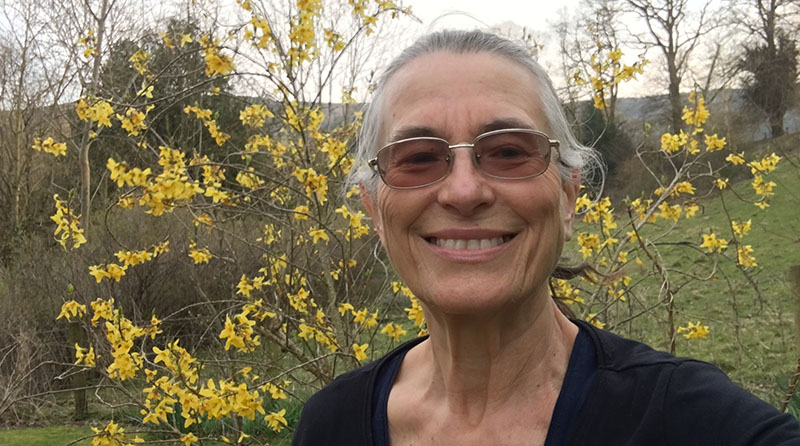
September – Fiona Collins Lockdown Legends
What is the project?
As lockdown began, I was asked to help in a local care home. Since then, I go three times a week and enjoy it greatly, though I had no previous experience of working with older people. However, as I’m 67, we probably have enough in common for me to be useful … I hope!
They had a lively programme of yoga sessions, hairdressing and music before the lockdown. I haven’t got skills in music, movement or hair modelling. But I am well used to talking and listening, so I started telling traditional tales and collecting personal stories.
An outcome of this work will be a book called ‘Lockdown Legends’, containing memories, photos from contributors’ collections, and drawings by the illustrator Peter Stevenson, to breathe life back into the stories on the page. The book will be presented to all the residents and their families. It will be a reminder of this strange time and of how they rose to the challenge to make the most of it.
This project inspired me to do similar work online, collecting memories from older people across Wales, some living independently, some in care homes. The online project, Lockdown Legends Online, was funded by Literature Wales. Ten unique stories will soon be available to enjoy on the Literature Wales website.
Who is it for and how can people get involved/engage?
This project reaches across generations, offering respect towards older people and a better understanding of others’ points of view.
Both Lockdown Legends and Lockdown Legends Online aimed to build connections between those who took part and their families and friends, rather than to share information with a wider audience.
This is a simple, worthwhile plan, easily recreated by anyone interested in family memories, or wanting more understanding of the recent past.
If you would like to create a similar project, face-to-face or via the phone or internet, open the conversation with genuine questions which are easy to answer – open questions, eliciting extended answers. I made it clear that every topic was the speaker’s choice, not mine, and tried to say as little as possible.
My method was simple – I scribbled notes as I listened, and typed them up as soon as I could, while I had fairly good recall of the conversation. About 45 minutes was an ideal length of time, without exhausting my contributors (their ages ranged from 72 to 99 years old, so it was important to be mindful of their needs). People were keen to speak, and enjoyed the opportunity to talk about their lives to a listener who was interested in their stories.
If you would like to undertake a similar project I would be happy to support you, or tell you more about my experiences. You are welcome to contact me! I really believe that this kind of exchange can be of great benefit.
Tell us more about yourself in a short biog. How did you start storytelling? How long have you been doing this? Where are you based etc? How do you work with story?
Storytelling was not part of my upbringing. I am a revival storyteller.
In the 80s, I taught in London, and performed improvised stories. I started attending storytelling workshops led by Mary Medlicott and Karen Tovell, my first mentors.
In 1989, I went to a Storytelling Festival in London.
I thought: ‘Why I am I making up stories alone, when so many stories exist, shaped by hundreds of voices?’
Since then, I have concentrated on traditional tales.
I have worked as a storyteller since 1993, apart from 18 months as the Warden at Tŷ Newydd Writers’ Centre, when I came to Wales in 2001.
Time without storytelling made me depressed. Clearly, storytelling is not a job to me, but a vocation. So I came back to storytelling.
I share stories, rather than perform them, and consider myself a community storyteller.
I now focus on mentoring young tellers, and storytelling in Welsh.
I am fairly fluent in Welsh ….. thanks to countless people. In 2019 I won Welsh Learner of the Year at the National Eisteddfod, and visited classes around Wales, encouraging tutors to tell folktales, to build the understanding and confidence of learners.
I created Story Circle at Venue Cymru so that children could ‘play’ with stories. The Circle also provides training to young storytellers, who work as co-leaders, supporting and learning from an experienced leader. Story Circle is now led by Gilly Brownson and Siân Miriam. My dream is to see Story Circles throughout Wales.
Lockdown Watch – something you have seen online that you want to share e.g. a video/podcast/online event that has inspired you at this time?
This is a talk from 2019, by Ken Robinson, who died during August this year. He was a seminal figure in British education in the 1980s, when I was a teacher, though he seems to have gone off to live in LA (presumably because the Westminster government, then as now, did not ‘get’ the importance of creativity)
His talk is called ‘Finding your element’ and is about identifying and doing what you love. As a storyteller, I am privileged to be doing exactly that, and this is a light hearted but perceptive guide that may be of help to people who haven’t yet found their talent, whatever it may be. My thanks to Ben Haggarty for posting this link, along with the news that Ken Robinson had died, on the online storytelling discussion group to which we both belong.
And this is my favourite song of the moment, Cân y Clo, created by four of Wales’ best folk musicians – all women – for this year’s online National Eisteddfod. I think it is very poignant.
I long now to hear the stories that record our experiences of lockdown, in the same way that this song does.